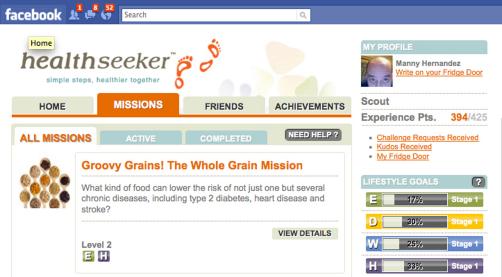Can Social Game Play Drive Healthier Behaviors?
Check out the new game on Facebook called Healthseeker. It was designed to use the psychological power of social game play to encourage healthier eating habits and lifestyle choices.
The picth is that getting healthier (more specifically managing diabetes risk) can be fun and happen with a little help from your friends. You select goals, chose a mission, earn experience points, give kudos, win badges, send challenges to friends and all the other social network dynamics that move heart-and-mind so well for hundreds of millions of people. The game is new. It has approximately 4000 members and 400 fans. The best description I have found so far is on Technology Review:
The challenge of this kind of game isn’t to convince people of something but to get them to act. “People are already emotionally committed to their health,” says Michael Fergusson, the founder and CEO of Ayogo. “They know they need to eat better and exercise.” But approaching that challenge all at once can seem overwhelming and thankless. “We pay them to take healthy actions,” says Fergusson. Reinforcing those small actions could turn them into habits that add up to better health.
They also discuss how other social games are changing behaviors. Healthseeker is an important experiment. We need more like it.
How can we use the features and functions of online interaction (social networks, online 3D worlds, etc.) that have proven cognitive impact to encourage behavior change for individual and social good?
